2014九年级英语unit6第一课时导学案
九年级Unit6导学案教案
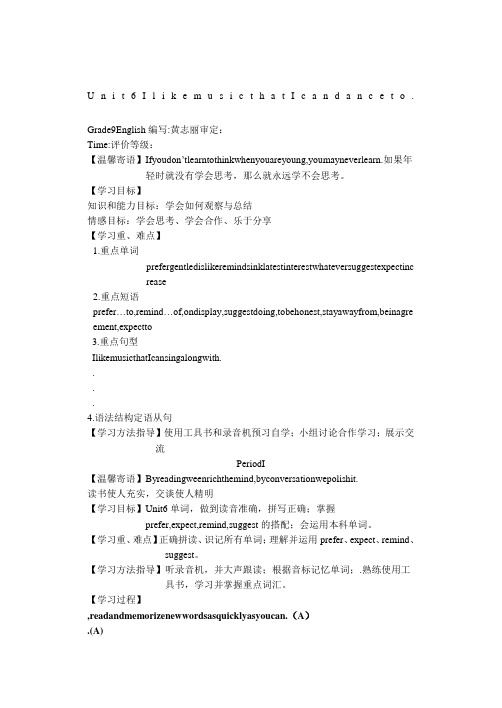
U n i t6I l i k e m u s i c t h a t I c a n d a n c e t o.Grade9English编写:黄志丽审定:Time:评价等级:【温馨寄语】Ifyoudon’tlearntothinkwhenyouareyoung,youmayneverlearn.如果年轻时就没有学会思考,那么就永远学不会思考。
【学习目标】知识和能力目标:学会如何观察与总结情感目标:学会思考、学会合作、乐于分享【学习重、难点】1.重点单词prefergentledislikeremindsinklatestinterestwhateversuggestexpectincrease2.重点短语prefer…to,remind…of,ondisplay,suggestdoing,tobehonest,stayawayfrom,beinagre ement,expectto3.重点句型IlikemusicthatIcansingalongwith....4.语法结构定语从句【学习方法指导】使用工具书和录音机预习自学;小组讨论合作学习;展示交流PeriodI【温馨寄语】Byreadingweenrichthemind,byconversationwepolishit.读书使人充实,交谈使人精明【学习目标】Unit6单词,做到读音准确,拼写正确;掌握prefer,expect,remind,suggest的搭配;会运用本科单词。
【学习重、难点】正确拼读、识记所有单词;理解并运用prefer、expect、remind、suggest。
【学习方法指导】听录音机,并大声跟读;根据音标记忆单词;.熟练使用工具书,学习并掌握重点词汇。
【学习过程】,readandmemorizenewwordsasquicklyasyoucan.(A).(A).(B&C)Prefer家族成员表:(单三、现在分词、过去时、过去分词、名词)_________________________________________________知识链接:(须将最后字母双写构成过去时、过去分词的单词)____________________________________________________观察与思考:’ttooloud/classicalmusic/ice-cream../..=Iwouldratherspendmoremoneyforabettercomputerthanpaylessforthisone..结论:prefer可以这样用___________________________________________________________________ ________________________________________一句多译我更愿意喝茶,而不是咖啡。
英语人教版九年级全册unit6教案

Unit 5What are the shirts made of?第一课时Section A(1a~2d)教学设计知识目标课堂环节§自主学习案翻译下列词组。
1.由……做成be__made__of/be__made__from2.在某地制造be__made__in__3.艺术和科学展览the__art__and__science__fair4.飞机模型a__model__plane5.因……出名be__famous__for/be__known__for6.在山边上on__the__sides__of__mountains7.手工制作by__hand8.世界各地all__over__the__world9.对……有好处be__good__for10.在过去in__the__past11.据我所知as__far__as__I__know§课堂导学案Step 1 准备与热身(Preparation)播放动画片《造纸过程》的视频,让学生们了解这个中国传统发明的情况。
T: Who invented paper first?S1:Cai Lun invented it in Han Dynasty.T: What was paper made of then?S2: It was mainly made of bamboo.T: Was it easy for people to make paper then?S1:No, it was very difficult then.T: What is paper made of now?S3: It's mainly made of wood, bamboo, and cotton.…Step 2 呈现与输入(Presentation)1.要求学生翻开课本P33页,快速阅读1a表格部分的内容。
把物品和可能构成他们的材料匹配起来。
人教版九年级英语Unit-6导学案
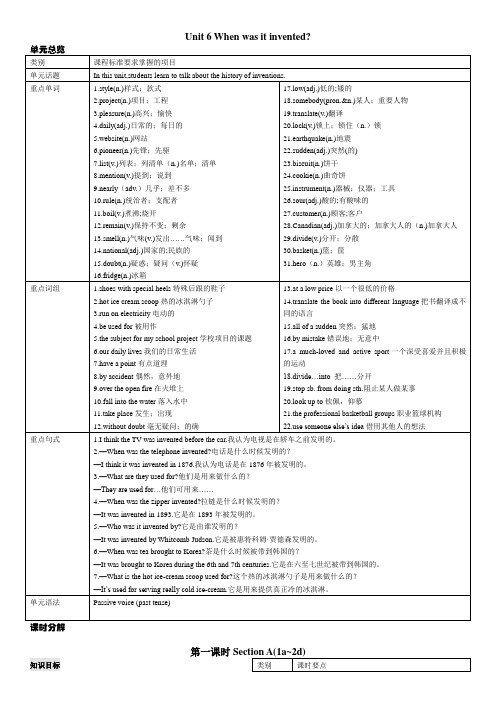
Unit 6 When was it invented?课时分解第一课时知识目标§自主学习方案【新词自查】根据句意及汉语提示完成句子。
1.I like the color of this coat but I don’t like its style (款式).2.It’s my great pleasure (高兴) to have a talk with you.3.The little inventions have helped me a lot in my daily (日常的)life.4.Julia introduced a good website (网站)to me to learn English.5.My mother always lists(列清单)all things that she wants to buy before shopping.§课堂导学方案Step 1情景导入参考案例Teacher: There are many useful things in the world.They help us a lot in life.(Show some pictures on the screen) When were they invented?Students:_______________________________①The telephone was invented in 1876.②The computer was invented in……(4分钟)环节说明:通过课前的一个师生问答互动引入新课的话题;通过图片的展示和语言的描述创设了情境,激发了学生的学习兴趣和表达欲望。
Step 2完成教材1a-1c的任务【操作案例】1.要求学生翻开课本P41,迅速阅读1a部分的内容。
并按要求完成课本上相应的任务。
(1分钟)2.检查答案,要求全班一起给出答案并检查讨论。
人教版九年级英语Unit6教案

Unit 6 When was it invented?Period 1 词汇学习课【学习目标】1.能够正确拼、读、写style, project, pleasure等词汇。
2.通过自主学习与小组合作,掌握词汇的拼读记忆规则和相关的词型转化。
3.能够与他人相互学习,相互帮助,提升自己的英语水平。
【难点】:基本词汇的固定搭配1. Read after the tape player together, correct your pronunciation.2. Prepare for your word reading in groups, then have a competition, the others give them marks.3. Look at some pictures and say out the new words.4. Learn the forms of the words.5. Summary:1.掌握了本单元重点词pleasure, translate等的词形变化。
2. 通过对单词的合理拓展,注重新旧单词的区别和联系,更好的掌握了pleasure, smell等单词。
6. Homework:1. 疯狂朗读记忆单词和相关词汇变化,准备第二天单词检测。
2. 完成Section A预习案自我反思:Period 2 Section A听说课(1b---2c)【学习目标】1.熟读Section A重点短语句子。
2.能够正确运用一般过去时的被动语态谈论物品的用途,发明的时间,发明者等相关话题。
3.热爱伟大的人类发明。
1. Go through the study-guide2. Study grammar:1). Learn some inventions and the inventors, then look at the pictures and practice these sentence structures:Sb. invented sth. in…Sth was invented by sb in.…Who was …invented by?/By whom was…invented?/When was … invented?What is it/are they used for?2). Pairwork: A: What is that/are those? B: It’s/ They’re…A: Who was it/were they invented by? B: It was /They were invented by …A: When was it/were they invented? B: It was/They were i nvented in …A: What is it/are they used for? B: It is /They are used for…3) Introduce the Chinese ancient inventions3. Practice1) 1a Number the inventions2) Listening practice: 1b Listen and match the inventions初三上英语导学案Unit 6 使用时间2014-10编制人:涂光渝郑丹妮 _ 审核人:涂光渝3) 1c Pairwork.4) 2a Listen.Listen and number the inventions2b Listen again and complete the chart.5)2c PairworkA: What are they used for…?B: They’re used for…4. Summary: 通过对话和听力练习熟练掌握了一般过去时被动语态的句子结构及本单元句型:What’s it used for?When was it invented?Who was it invented by?5. Homework:1. 完成新支点的第一课时。
【人教版】九年级全一册英语:Unit 6单元导学案Unit 6 导学案
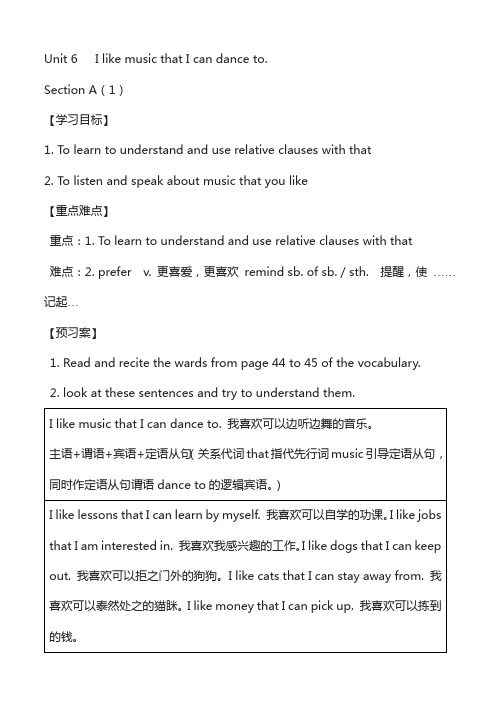
Unit 6 I like music that I can dance to.Section A(1)【学习目标】1. To learn to understand and use relative clauses with that2. To listen and speak about music that you like【重点难点】重点:1. To learn to understand and use relative clauses with that难点:2. prefer v. 更喜爱,更喜欢 remind sb. of sb. / sth. 提醒,使……记起…【预习案】1. Read and recite the wards from page 44 to 45 of the vocabulary.2. look at these sentences and try to understand them.I like music that I can dance to. 我喜欢可以边听边舞的音乐。
主语+谓语+宾语+定语从句(关系代词that指代先行词music引导定语从句,同时作定语从句谓语dance to的逻辑宾语。
)I like lessons that I can learn by myself. 我喜欢可以自学的功课。
I like jobs that I am interested in. 我喜欢我感兴趣的工作。
I like dogs that I can keep out. 我喜欢可以拒之门外的狗狗。
I like cats that I can stay away from. 我喜欢可以泰然处之的猫眯。
I like money that I can pick up. 我喜欢可以拣到的钱。
【探究案】1. prefer v. 更喜爱,更喜欢choose sth. rather than sth. else; like sth. better1) prefer + n. eg.I prefer groups that play quiet and gentle songs. 我更喜欢演唱轻柔音乐的组合。
初中英语_unit6 An old man tried to move the mountains(Section A 1a教学设计学情分析教材分析课后反思
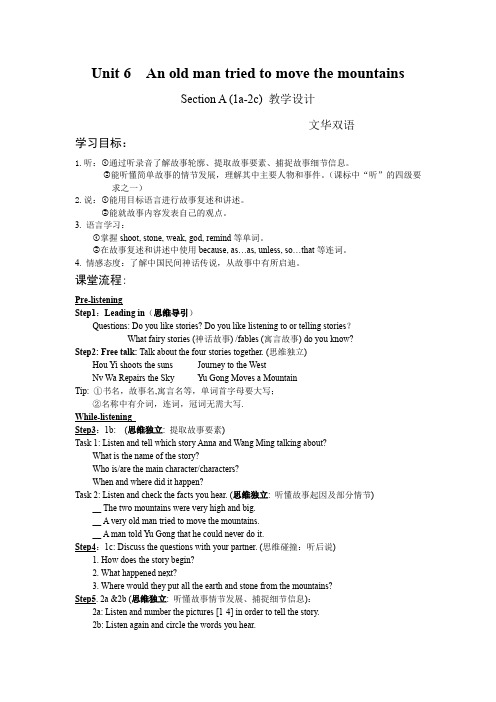
Unit 6 An old man tried to move the mountainsSection A (1a-2c) 教学设计文华双语学习目标:1.听:①通过听录音了解故事轮廓、提取故事要素、捕捉故事细节信息。
②能听懂简单故事的情节发展,理解其中主要人物和事件。
(课标中“听”的四级要求之一)2.说:①能用目标语言进行故事复述和讲述。
②能就故事内容发表自己的观点。
3. 语言学习:①掌握shoot, stone, weak, god, remind等单词。
②在故事复述和讲述中使用because, as…as, unless, so…that等连词。
4. 情感态度:了解中国民间神话传说,从故事中有所启迪。
课堂流程:Pre-listeningStep1:Leading in(思维导引)Questions: Do you like stories? Do you like listening to or telling stories?What fairy stories (神话故事) /fables (寓言故事) do you know?Step2: Free talk: Talk about the four stories together. (思维独立)Hou Yi shoots the suns Journey to the WestNv Wa Repairs the Sky Yu Gong Moves a MountainTip: ①书名,故事名,寓言名等,单词首字母要大写;②名称中有介词,连词,冠词无需大写.While-listeningStep3:1b: (思维独立: 提取故事要素)Task 1: Listen and tell which story Anna and Wang Ming talking about?What is the name of the story?Who is/are the main character/characters?When and where did it happen?Task 2: Listen and check the facts you hear. (思维独立: 听懂故事起因及部分情节) __ The two mountains were very high and big.__ A very old man tried to move the mountains.__ A man told Y u Gong that he could never do it.Step4:1c: Discuss the questions with your partner. (思维碰撞:听后说)1. How does the story begin?2. What happened next?3. Where would they put all the earth and stone from the mountains?Step5. 2a &2b (思维独立: 听懂故事情节发展、捕捉细节信息):2a: Listen and number the pictures [1-4] in order to tell the story.2b: Listen again and circle the words you hear.Step6. Discussion(思维碰撞:语言学习)Fragment 1:As soon as the man finished talking, Yu Gong said that his family would continue to move the mountains after he died. Finally, a god was so moved by Yu Gong that he sent two gods to take the mountains away. This story reminds us that you can never know what's possible unless you try to make it happen.Fragment 2:The man finished talking, Y u Gong said that his family would continue to move the mountains after he died. A god was moved. He sent two gods to take the mountains away. This story reminds us that you try to make it happen and you can know what's possible.此处连词的使用:①起强调作用,使情感语气加强;②起连接作用,使上下文更流畅、逻辑通顺;③起修饰作用,使句式更富于变化、语言更生动,故事听起来更绘声绘色。
九年级Unit6导学案教案
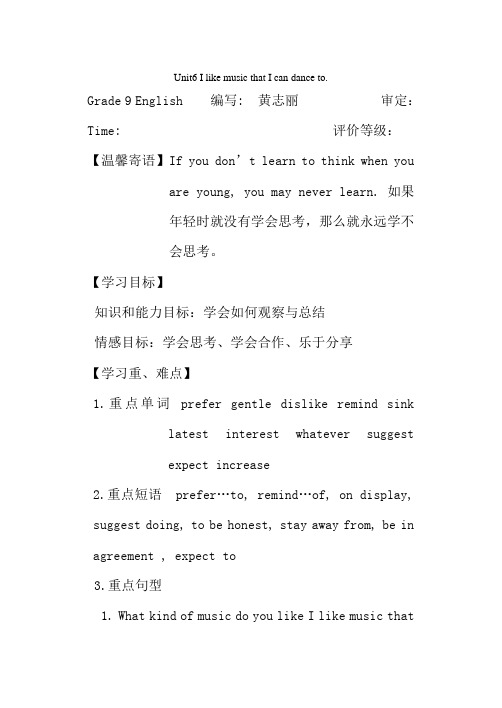
Unit6 I like music that I can dance to.Grade 9 English 编写: 黄志丽审定:Time: 评价等级:【温馨寄语】If you don’t learn to think when you are young, you may never learn. 如果年轻时就没有学会思考,那么就永远学不会思考。
【学习目标】知识和能力目标:学会如何观察与总结情感目标:学会思考、学会合作、乐于分享【学习重、难点】1.重点单词prefer gentle dislike remind sinklatest interest whatever suggestexpect increase2.重点短语 prefer…to, remind…of, on display, suggest doing, to be honest, stay away from, be in agreement , expect to3.重点句型1. What kind of music do you like I like music thatI can sing along with.2. We prefer music that has great lyrics.3. I love singers who write their own music.4. Xu Fei prefers groups that play quiet and gentle songs.4.语法结构定语从句【学习方法指导】使用工具书和录音机预习自学;小组讨论合作学习;展示交流Period I【温馨寄语】 By reading we enrich the mind, by conversation we polish it.读书使人充实,交谈使人精明【学习目标】Unit 6单词,做到读音准确,拼写正确;掌握prefer, expect, remind, suggest的搭配;会运用本科单词。
2014新目标九年级英语Unit6 3a-3c 导学案
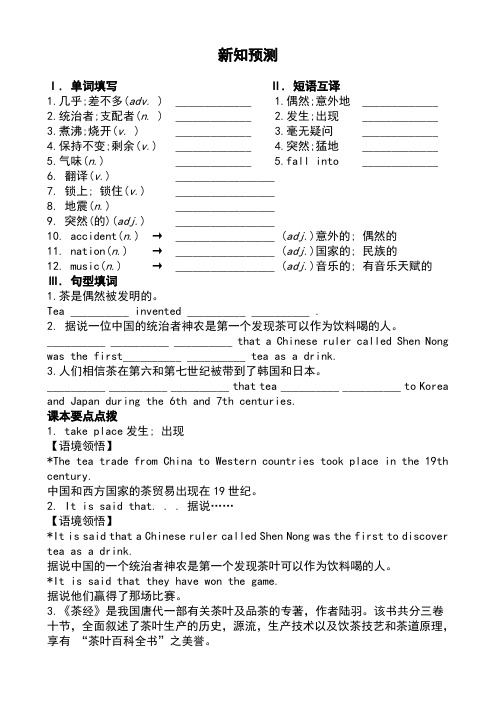
新知预测Ⅰ. 单词填写Ⅱ. 短语互译1.几乎;差不多(adv. ) _____________ 1.偶然;意外地 _____________2.统治者;支配者(n. ) _____________ 2.发生;出现 _____________3.煮沸;烧开(v. ) _____________ 3.毫无疑问 _____________4.保持不变;剩余(v.) _____________ 4.突然;猛地 _____________5.气味(n.) _____________ 5.fall into _____________6. 翻译(v.) _________________7. 锁上; 锁住(v.) _________________8. 地震(n.) _________________9. 突然(的)(adj.) _________________10. accident(n.) → _________________ (adj.)意外的; 偶然的11. nation(n.) → _________________ (adj.)国家的; 民族的12. music(n.) → _________________ (adj.)音乐的; 有音乐天赋的Ⅲ. 句型填词1.茶是偶然被发明的。
Tea __________ invented __________ __________ .2. 据说一位中国的统治者神农是第一个发现茶可以作为饮料喝的人。
__________ __________ __________ that a Chinese ruler called Shen Nong was the first__________ __________ tea as a drink.3.人们相信茶在第六和第七世纪被带到了韩国和日本。
__________ __________ __________ that tea __________ __________ to Korea and Japan during the 6th and 7th centuries.课本要点点拨1. take place发生; 出现【语境领悟】*The tea trade from China to Western countries took place in the 19th century.中国和西方国家的茶贸易出现在19世纪。
新目标英语九年级unit6导学案
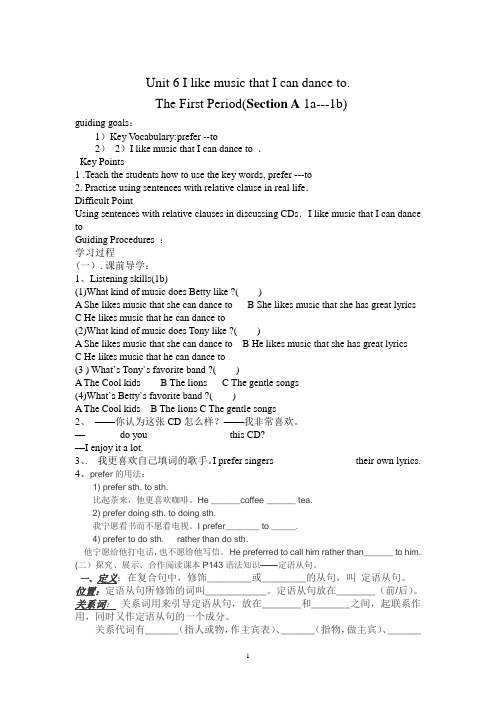
Unit 6 I like music that I can dance to.The First Period(Section A 1a---1b)guiding goals:1)Key V ocabulary:prefer --to2)2)I like music that I can dance to .Key Points1 .Teach the students how to use the key words, prefer ---to2. Practise using sentences with relative clause in real life.Difficult PointUsing sentences with relative clauses in discussing CDs.I like music that I can dance toGuiding Procedures :学习过程(一).课前导学:1、Listening skills(1b)(1)What kind of music does Betty like ?( )A She likes music that she can dance toB She likes music that she has great lyricsC He likes music that he can dance to(2)What kind of music does Tony like ?( )A She likes music that she can dance toB He likes music that she has great lyricsC He likes music that he can dance to(3 ) What`s Tony`s favorite band ?( )A The Cool kidsB The lionsC The gentle songs(4)What`s Betty`s favorite band ?( )A The Cool kidsB The lionsC The gentle songs2、——你认为这张CD怎么样?——我非常喜欢。
九年级英语上册 Unit 6 TV programmes readingⅠ导学案(无答案)牛津版(
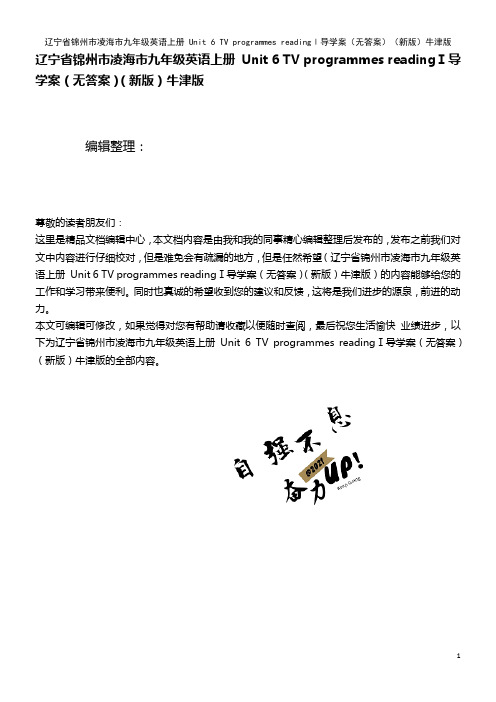
辽宁省锦州市凌海市九年级英语上册Unit 6 TV programmes readingⅠ导学案(无答案)(新版)牛津版编辑整理:尊敬的读者朋友们:这里是精品文档编辑中心,本文档内容是由我和我的同事精心编辑整理后发布的,发布之前我们对文中内容进行仔细校对,但是难免会有疏漏的地方,但是任然希望(辽宁省锦州市凌海市九年级英语上册Unit 6 TV programmes readingⅠ导学案(无答案)(新版)牛津版)的内容能够给您的工作和学习带来便利。
同时也真诚的希望收到您的建议和反馈,这将是我们进步的源泉,前进的动力。
本文可编辑可修改,如果觉得对您有帮助请收藏以便随时查阅,最后祝您生活愉快业绩进步,以下为辽宁省锦州市凌海市九年级英语上册Unit 6 TV programmes readingⅠ导学案(无答案)(新版)牛津版的全部内容。
Unit 6 TV programmer—readingⅠ【导学目标】1。
进一步认识和掌握与电视节目相关的词汇、词组2.提高根据所阅读的文章判断正误的能力3。
把学生的爱好和时间安排与电视节目匹配起来4.鼓励学生拥有适度的、合理的业余爱好【导学重难点】1。
进一步认识和掌握与电视节目相关的词汇、词组2.提高根据所阅读的文章判断正误的能力【导学过程】一.自主预习(一)预习本课的生词,你会读吗?根据音标和规则试着读几遍吧,并理解他们的词义和词性, 把不会读的记下来_______________________________________________________________________(二) 听录音,跟读P80-81课文至少三遍,注意模仿语音语调。
二.合作交流1。
小组合作,互相检查预习的情况, 讨论解决预习中的问题。
2.完成课本B1题,小组成员互相检测.3.阅读课文回答下列问题:When can we watch TV?How can we know some information about TV programmes?4.阅读Beijing Music Awards这段文章,回答下列问题:How will this year's Beijing Music Awar ds be covered ?Who will attend the presentation ?What have lots of fans voted online for?How can people win two free concert tickets ?5.阅读Golden TV Murder in a Country House 部分,完成下列填空题:‘Murder in a Co untry House' is a h_______ film d_______ by Cindy Clark, a new d________. In the film, a doctor is found d_____ in his house。
新目标英语九年级Unit6 Period 1 教案
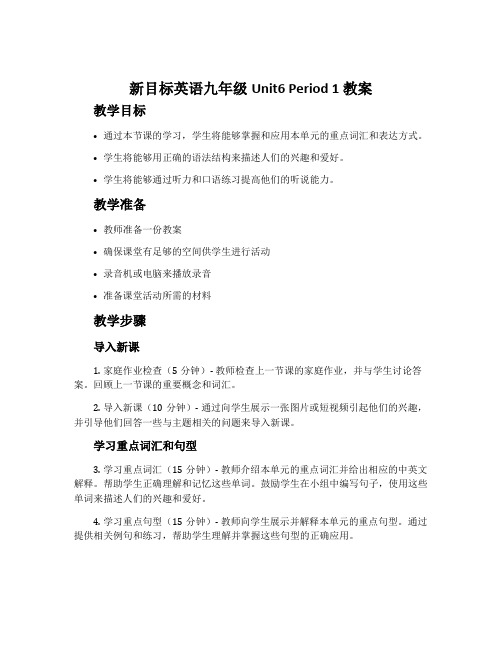
新目标英语九年级Unit6 Period 1 教案教学目标•通过本节课的学习,学生将能够掌握和应用本单元的重点词汇和表达方式。
•学生将能够用正确的语法结构来描述人们的兴趣和爱好。
•学生将能够通过听力和口语练习提高他们的听说能力。
教学准备•教师准备一份教案•确保课堂有足够的空间供学生进行活动•录音机或电脑来播放录音•准备课堂活动所需的材料教学步骤导入新课1.家庭作业检查(5分钟)- 教师检查上一节课的家庭作业,并与学生讨论答案。
回顾上一节课的重要概念和词汇。
2.导入新课(10分钟)- 通过向学生展示一张图片或短视频引起他们的兴趣,并引导他们回答一些与主题相关的问题来导入新课。
学习重点词汇和句型3.学习重点词汇(15分钟)- 教师介绍本单元的重点词汇并给出相应的中英文解释。
帮助学生正确理解和记忆这些单词。
鼓励学生在小组中编写句子,使用这些单词来描述人们的兴趣和爱好。
4.学习重点句型(15分钟)- 教师向学生展示并解释本单元的重点句型。
通过提供相关例句和练习,帮助学生理解并掌握这些句型的正确应用。
听力练习5.听力练习(15分钟)- 教师播放一个有关人们兴趣爱好的录音,并要求学生根据听到的内容回答问题。
播放录音两次,并在第二次播放前给学生一些时间来准备并记笔记。
6.听力练习检查(10分钟)- 教师和学生一起检查听力练习的答案,并提供正确答案的解释。
鼓励学生提问并互相解答问题,以促进他们的听理解能力。
口语练习7.口语练习(20分钟)- 学生分成小组,进行口语练习。
每个学生都有机会用本单元的重点词汇和句型来描述和分享自己的兴趣和爱好。
教师可以提供一些话题和问题来引导学生的对话。
8.小组展示(10分钟)- 每个小组派出一名代表进行展示,分享他们小组中讨论的一些有趣的兴趣和爱好。
鼓励其他学生提出问题、评论和建议。
总结和作业布置9.总结(5分钟)- 教师对本节课的学习内容进行总结,并强调学生在口语练习中所掌握的技巧与表达方式。
九年级英语Unit6导学案.docx

平川二中九年级英语Unit 6自主学习导学案班级姓名时间教研组长(签字)贾成祥学校领导(审核)张天文设计人:贾成祥Lesson 31: Movie or Play?1.Learning aims:The words: involve, script, director, direct, costume, background, task2.Learning important and difficult points:1)direct2)involve3)不定式的被动语态3.合作探究Read and check the answers .4.自我展示Divide the class into groups and choose one from each group to answer the questions .5.拓展创新1.direct【用法】作及物动词,意为“指导、导演”,后加名词或代词作宾语。
【举例】Do you know who will direct this new movie?你知道谁将会导演这部新电影?【用法】作形容词,意为“直接的、率直的”,可作定语或表语。
【举例】Danny, we need you direct answer.丹尼,我们需要你直接的冋答。
2.Most of you have seen movies or plays in a theatre, blit have you ever been involved in making a movie or a play?你们大多在影院看过电影或戏剧,但你们参与过制作电影或戏剧吗?【用法】involve是及物动词,意为"参与、专心于”,而句式involve in doing something则表示"参与做某事”,如果表示"参与某事”用involve in something即可。
九年级英语(Go for it)unit6导学案

Unit 6 I like music that I can dance to.第一课时Section A(1a-2c) 编写:都正善学习目标知识目标:重点单词:prefer, lyric, gentle重点短语:dance to, sing along with, different kinds of, play quiet and gentle songs重点句型:(1)—What kind of music do you like ?—I like music that I can sing along with.(2) I prefer music that has great lyrics.(3) I like musicians who play different kinds of music.能力目标:运用定语从句,学习表达自己或他人对某人某物的偏好。
情感目标:学会谈论自己喜欢的音乐,培养正确的审美情趣。
导入新课向学生介绍定语从句。
(课件展示)一.自主研学,理解新知一)用that或who完成句子。
1.I like music ______ isn’t too loud.2.Carmen likes musicians ______ play different kinds of music.3.Xu Fei prefers groups ______ play quiet and gentle songs.二)句型展示台4.我喜欢我能跟着跳舞的音乐。
I love music _________________________.5.—你更喜欢那种音乐?—What ____________ music do you _______ ?—我更喜欢我能随之唱歌的音乐。
—I ________ music that I can ______________________.6.Rosa 喜欢音乐轻柔的。
人教版九年级英语上册Unit6导学案
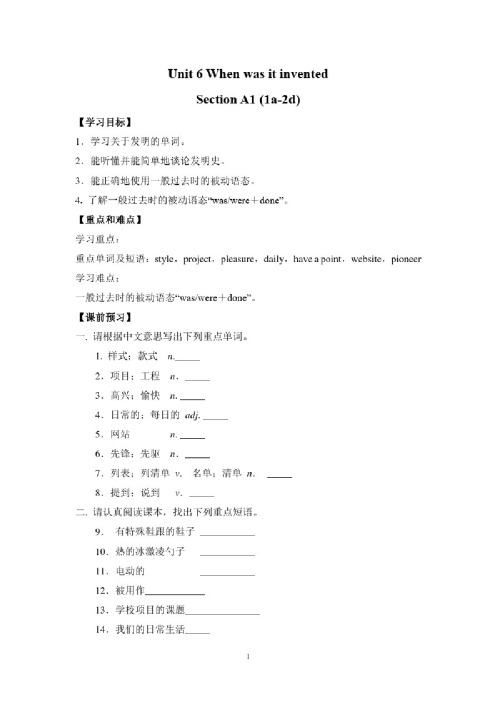
Unit6When was it inventedSection Al(la-2d)【学习目标】1.学习关于发明的单词。
2.能听憧并能简单地谈论发明史。
3. 能正确地使用一般过去时的被动语态。
4.了解一般过去时的被动语态Fas/were+done”。
【重点和难点】学习重点:重点单词及短语:style.project*pleasure,daily,have a point.website,pioneer 学习难点:―般过去时的被动语态Fas/were+done'' □【课前预习】请根据中文意思写出下列重点单词。
1.样式;款式n.2.项目:工程n.______3.高兴;愉快______4.日常的:每日的adi.______5.网站n.______6.先锋:先驱11.______7.列表;列清单V.名单;清单〃8.提到;说到/______二.请认真阅读课本,找出下列重点短语。
9.有特殊鞋跟的鞋子10.热的冰激凌勺子H.电动的_____________12.被用作______________13.学校项日的课题14.我们的日常生活15.有道理三.请用以上重点短语完成下列句子。
16.它们是用来做什么的?What are they?17.我认为电视机是在汽车之后被发明的。
I think the TV the car.【合作探究】探究一、浏览la.lb中的图片,参考发明时间和发明家试着完成表格。
Time:1876,1885,1927,1971、Inventors:Carl Bens.Alexander Bell.J.L.Baird.John\bn Neumann Inventions Questions Answerszipper VMien was the zipperinvented?It was invented in1893.XMio was it invented by?It was invented by WhitcombJudson.TV setcarstelephonecomputers探究二、仔细阅读下列短语,在书中标记。
九上英语第六单元导学案.doc

速记背:
•请同学们在最短的时间内记住自主学习环节中的单词,短语和句子。
当堂练:
课课练P57
家庭作业:
1、背记本节课的单词,短语和句子,并且抄写。
2、熟读Comic strip和Part B部分,有能力的同学力争背诵。
反思:
课题
Unit6TV Programmes Reading 1
1.Is Eddie getting bored with staying at home all day?
2.Why not ?
3.Does Hobo agree with Eddie?
4.What does Eddie do every day?
Then read together. Pay attention to your pronunciation.
B、1•快速阅读,回答问题(课课练P58)
2.仔细阅读短文,完成信息表(课课练P58)
-:“思”一一乐学精思
精倂助思:
1.通过提问,帮学生进一步熟悉课文
2.听录音跟读,模仿其语音语调,加深对课文的理解
3.课本Page82, Part Bl, B2、B3&Part B4
KT匕质疑(小组合乍丿
小组合作,完成课本Page52 Part B4
2.听中环节:播放录音第一遍,让学生只听不写;第二遍,边听边写;需要的话,播放第三 遍,同学们分享答案与听力心得。
3.两人一组,完成P87PartA2> P88A3«(判断正误并说Hi错误原因)
4.朗读
Speak up
1、两人一组,先熟读对话并力争表演。
2、听录音,检验自己的朗读强处与弱点。
三:“练”——巩固反馈
人教版九年级英语上册Unit 6《When was it invented》导学案及课堂练习含答案

人教版九年级英语上册Unit 6《When was it invented?》导学案及课堂练习含答案第一课时Section A(1a—2d)【学习目标】1.掌握单词:heel, scoop, electricity, style, project, pleasure, zipper, daily, website, pioneer, list, mention2.掌握短语:shoes with special heels , have a point, run on electricity, be used for, with pleasure,3.掌握句型:I think the TV was invented before the car.---When was the telephone invented? ---I think it was invented in 1876.--- What are they used for? ---They are used for changing the style of the shoes.4.掌握语法:一般过去时态的被动用法。
让学生体验大量语言结构和该结构所表达的功能意义,在他们有了一定的感性认识的基础上,引导他们概括语言结构的特点和功能。
【预习与交流】旧知回顾写出下列单词的过去分词。
invent____________ use______________ change _____________drink ___________bring __________produce _____________ sell ___________steal ___________advise__________ take ____________translate ___________eat ___________新知准备根据汉语提示完成单词。
1. I like the color of this coat but I don’t like its________ (款式).2. It’s my great________ (高兴) to have a talk with you.3. The little inventions have helped me a lot in my ________ (日常的)life.4. Julia introduced a good________ (网站)to me to learn English.5. My mother always________(列清单)all things that she wants to buy before shopping.【自学与合作】According to 2d, fill in the blanks with the right words.Last week, Roy saw a________, it says the zipper is one of the________ small inventions that________ the world. It ________that the zipper was ________by Whitcomb Judson in 1893. but at that time, it wasn’t ________used. Paul thinks he seems to have a ________. The zipper is really________ a great invention and it’s used in our ________lives very often .文化背景知识美国人怎样表达他们对爱迪生的敬意托马斯·阿尔瓦·爱迪生获得的发明专利,超过了任何一位美国人。
2014最新人教版九年级英语unit-6教案
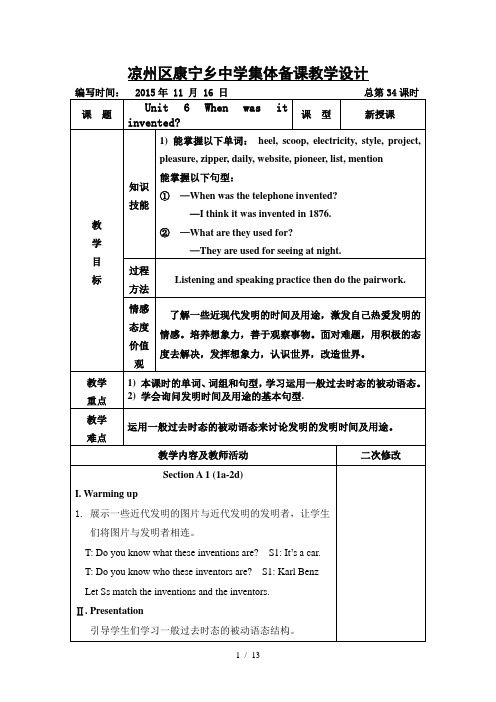
编写时间: 2015年11月16日 总第34课时
课题
Unit6When was it invented?
课型
新授课
教
学
目
标
知识
技能
1)能掌握以下单词:heel, scoop, electricity, style, project, pleasure, zipper, daily, website, pioneer, list, mention
价值
观
培养想象力,善于观察事物。面对难题,用积极的态度去解决,发挥想象力,认识世界,改造世界。
教学
重点
1)掌握本部分出现的生词和词组,达到熟练运用的目标。
2)阅读短文,获得相关的信息。通过阅读练习,来提高阅读能力。
教学
难点
1)阅读短文,获得相关的信息的能力。
2)理解并运用所学的词汇及表达方式。
教学内容及教师活动
IV. Learning the new words & Listening
Look at the pictures then learn the new words.
Work on 2a:
T:Tell Ss they will hear some interesting inventions.
1. Look at the pictures in 2a. Discuss the things what they are used for.
Ss read the article quickly andmatch each paragraph with its main idea.
Work on 3b:
1.告诉学生们再次阅读短文内容,并回答3b中的所有问题。
人教版英语九年级全册Unit6__SectionA(1a-1c)精品导学案
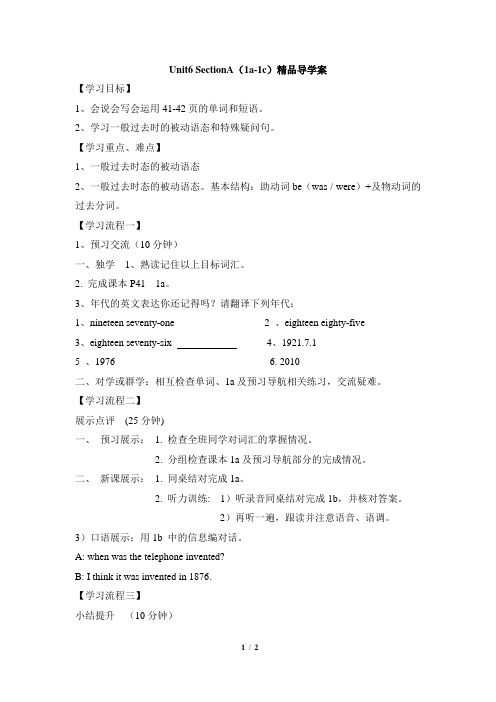
Unit6 SectionA(1a-1c)精品导学案【学习目标】1、会说会写会运用41-42页的单词和短语。
2、学习一般过去时的被动语态和特殊疑问句。
【学习重点、难点】1、一般过去时态的被动语态2、一般过去时态的被动语态。
基本结构:助动词be(was / were)+及物动词的过去分词。
【学习流程一】1、预习交流(10分钟)一、独学1、熟读记住以上目标词汇。
2. 完成课本P41 1a。
3、年代的英文表达你还记得吗?请翻译下列年代:1、nineteen seventy-one____________ 2 、eighteen eighty-five__________ 3、eighteen seventy-six 4、1921.7.1_________________5 、1976______________________ 6. 2010____________________二、对学或群学:相互检查单词、1a及预习导航相关练习,交流疑难。
【学习流程二】展示点评(25分钟)一、预习展示: 1. 检查全班同学对词汇的掌握情况。
2. 分组检查课本1a及预习导航部分的完成情况。
二、新课展示: 1. 同桌结对完成1a。
2. 听力训练: 1)听录音同桌结对完成1b,并核对答案。
2)再听一遍,跟读并注意语音、语调。
3)口语展示:用1b 中的信息编对话。
A: when was the telephone invented?B: I think it was invented in 1876.【学习流程三】小结提升(10分钟)1. 各自对本课时所学知识进行小结。
2.用所给动词的正确形式填;(1)My shoes are worn out. Can they (mend)?(2)That building (use) as a hotel last year.(3)Lisa (hear) to sing a song in her bedroom just now.(4)The s ong “Tiankong” (sing) by Tan Jing in both Chinese and English. (5)The Olympic Games (hold) every four years.(6)If more time (give), we can do it better.。
- 1、下载文档前请自行甄别文档内容的完整性,平台不提供额外的编辑、内容补充、找答案等附加服务。
- 2、"仅部分预览"的文档,不可在线预览部分如存在完整性等问题,可反馈申请退款(可完整预览的文档不适用该条件!)。
- 3、如文档侵犯您的权益,请联系客服反馈,我们会尽快为您处理(人工客服工作时间:9:00-18:30)。
Unit 6 When was it invented? 第一课时Section A (1a -2d)导学案
授课人: 班级 姓名 完成时间 【学习目标】:
Goal 1.熟读下列单词、短语并写出中文意思
1 style
2 project
3 pleasure
4 daily
5 website
6 pioneer
7 list
8 mention
9 have a point 10 be used for 11my pleasure 12 in one ’s daily life 【学习重点】:掌握一般过去时态的被动语态构成
【自主预习】:预习课本 P41到42, 写出下列新单词及短语并背诵。
一、完成下面的汉译英。
A:单词默写:
1电;电能 2高兴;愉快 3 日常的 4 列表 5提到;说到 6 拉链 7 网站 8 项目;工程 9样式;款式 10先锋;先驱 11 发明 12发明者 B :短语过关:
13改变世界___________ 14在那时__________15带灯的鞋__________
16非常乐意 17有道理__________ 18想到,考虑__________ 19在我们的日常生活中 20在1893年__________ 20被用来干某事 21如此伟大的一项发明__________
C :句子过关:
22 .我认为电视是在汽车之前被发明的。
I think TV before the car. 23. 这种机器用于洗衣服。
This kind of machine clothes. 24. 他不喜欢这顶帽子的款式。
I don ’t like the cap. 25.我想到它是因为我上周看到了一家网站。
I it because I last week. 26.它提到拉链是1893年被Whitcomb Judson 发明的。
It that the zipper Whitcomb Judson in 1893. 27.在我们的日常生活中许多小发明已经改变了世界。
Many small has the world . 【合作探究】 :仔细阅读例句A 被动语态的各种变化。
试一试把例句B 进行变化,相信你一定会学会变被动语态的! 一般过去时态的被动语态构成:was/were+done
肯定句:主语+was/were+done + (by sb)其他:
例句A Bell invented the telephone in 1876.(变被动句)
1 The telephone (by Bell )in 1876
例句B That old man planted the trees in our school last year. (变被动句)
2 The trees that old man in our school last year. 否定式:主语+was/were+not+done + (by sb)+其他
3 The telephone (by Bell) in 1876.
4 The trees that old man in our school last year.
一般疑问句:Was/Were+主语+done + (by sb)+其他?
5 the telephone (by Bell) in 187
6 6 the trees (by that old man ) in our school ? 特殊疑问句:特殊疑问词+was/were+主语+done +其他?
7 When the telephone (by Bell)?
8 Where the trees (by that old man ) last year? 【课堂检测】:一、填空。
1. English is ________ (wide) used in the world.
2. The cars ________ (make) in Shanghai in 2010.
3.We _________ (tell)not to play computer games on weekdays yesterday. 4 . The shopping list ______(list) by the teacher.
5 .In the old days, they _________(make) _________(work) all day. 6. What is the most _________(use) invention in the world?
7. Edison was a great ______(invent). He had a lot of useful ______(invent)
in his life.
8. The camera is used for ______(take) photos.
9. Can you help me with the heavy box? With p_________ . 10.They were all the _________ (先驱)of the American West. 11. How often are zippers used in our _________(日常的) lives? 二、单项选择。
12.What ’s it used for? It ’s used for_________ .
A. cook
B. cooking
C. cooked
D. to cook
13. Thank you very much for helping me with my math. ---It ’ s my_________ A. pleasure B. pleased C. please D. pleasant
14.There are more people and less energy ,so we must save water and_______ . A. electric B. electrical C. electrician D. electricity
15. Cars were invented _________ 1885. A. on B. at C. for D. in 16. The young_________ has twenty_________ . A.inventor ;inventor B. invention ;inventions C. inventor ;inventions D. invention ;inventors 四、将下列句子改为被动语态。
17 .I sent a letter to you last month. ____________________________
18. Do we use it for cooking ?____________________________ 19. The workers build the bridge last year._____________________________ 20. She bought a dictionary yesterday. _____________________________ 21 . When did people invent paper? _____________________________
【归纳小结】本节课我学会了:
1、
2、 【课后反思】。
